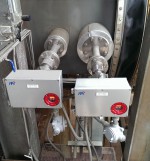Meeting MCPD demands for industrial boilers
Published: 28 March, 2018
With the Medium Combustion Plant Directive (MCPD) now European law, Kevin Houlden, Industrial and Commercial Specialist at Calor, advises on the steps that operators can take to upgrade their existing boiler plant.
The MCPD became European law on 19th December 2017, setting emissions limit values (ELVs) to reduce levels of harmful sulphur dioxide (SO2) nitrogen oxides (NOX) and particulates in exhaust gases from all combustion plant rated between 1 MW and 50 MW thermal input. All new plants that are first operated after 20 December 2018 must be registered with the Competent Authority and comply with new ELVs from that date.
However, currently only five of the 43 Air Quality Zones in the UK meet the requirements for NOx emissions levels laid out in the directive, with slow progress forecast over the next twenty years. The MCPD rules also allow the Competent Authority to change these limits because of poor local air quality should they choose to do so, meaning the finished regulation in the UK is still to be determined, particularly in relation to further restricting emissions in areas that do not meet certain air quality requirements (Directive 2008/50/EC).
For existing heavy fuel oil-fired boilers in particular, it is clear that this fuel source cannot meet future ELVs. As a result, operators considering upgrading or switching their boiler plant in order to ensure compliance with the MCPD need to consider carefully the long-term implications if these ELVs are reduced even further in the future.
Fuel choice
The change is expected to affect around 150,000 medium combustion plants across Europe, of which 17,000 are located in the UK, using systems such as boilers, turbines and electricity generators.
In addition, there are around 250,000 businesses located off the mains gas network in the UK. This means that there are a significant number of operators who will face the additional challenge of choosing the cleanest, most economically-viable energy solution when their boiler needs replacing.
The ELVs set in the MCPD will have to be applied from 20 December 2018 for new plants and by 2025 or 2030 for existing plants, depending on their size. With the average lifespan of a commercial boiler between 10-15 years, it pays to think carefully now about new capital equipment investment, to ensure that any boiler plant specified will be capable of meeting the new standard.
Unfortunately, heavy-fuel oil installations will not meet the new ELVs for SO2 or particulates without abatement. This may make some operators more cautious about investing in oil-fired technologies.
A switch to LNG or LPG?
Switching to liquefied natural gas (LNG) or liquefied petroleum gas (LPG) can enable operators to ensure their installation meets the demands of the MCPD. Both fuels already meet standards for SO2 and NOX and particulate emissions as well as offering reduced CO2 output, with margin to handle some tightening of ELVs in the future.
Burning gas emits less CO2 in comparison to some oil types, with LNG being the cleanest burning of all fossil fuels available off-grid, offering a further step change in carbon reductions.
These clean burning properties also enable improved boiler efficiencies, which can exceed 90% as well as reduced maintenance, both of which contribute to long term reduction in operational costs.
One success story is C&D Foods, a premium dry pet food manufacturer, which has saved in excess of £50,000 and more than halved its CO2 emissions since converting its boiler fuel from oil to LPG from Calor.
Future proofed
LNG and LPG offer a cost-effective energy supply with cleaner-burning, lower carbon outputs to oil. With a mature market of boiler and burner technologies readily available, the fuels are ready and able to meet the challenging emissions limits of the MCPD – if and when they change in the future.
For further information please visit: www.calor.co.uk/business





 A new range of process gas analysers based on tuneable diode laser absorption spectroscopy (TDLAS) is now reportedly available from QUANTITECH. “Whilst these instruments are new to the UK and Ireland, the manufacturer Focused Photonics Inc has an installed base of over 8,000 instruments, so this is a well-established technology,” says Quantitech’s Keith Golding.
A new range of process gas analysers based on tuneable diode laser absorption spectroscopy (TDLAS) is now reportedly available from QUANTITECH. “Whilst these instruments are new to the UK and Ireland, the manufacturer Focused Photonics Inc has an installed base of over 8,000 instruments, so this is a well-established technology,” says Quantitech’s Keith Golding.
